
How UK protesters are taking the spark of Black Lives Matter back to their hometowns
George Floyd's death at the hands of a Minneapolis police officer in May sparked a mass global movement against structural racism and police brutality.
The outcry began in Minnesota, but campaigners spread the spark of the movement to towns around the world. In the UK, even as the coronavirus pandemic gripped the country, tens of thousands of demonstrators marched in the streets of its major cities.
In June, large crowds protested outside Parliament Square and the US Embassy in London, in Manchester's Piccadilly Gardens and in central Birmingham.
Yet the movement also spread outside Britain's big urban centers, as anti-racist campaigners challenged institutional racism in smaller towns and cities which have less ethnic diversity and are less known for their activism. The tragedy of Floyd's death inspired ordinary people, thousands of miles away in the UK, to fight for institutional change in their communities under the banner of "Black Lives Matter" (BLM).
Six months later, here are some of the voices of those continuing to fight for racial equality outside of the global spotlight.
Maia Thomas
Equality activist, Exeter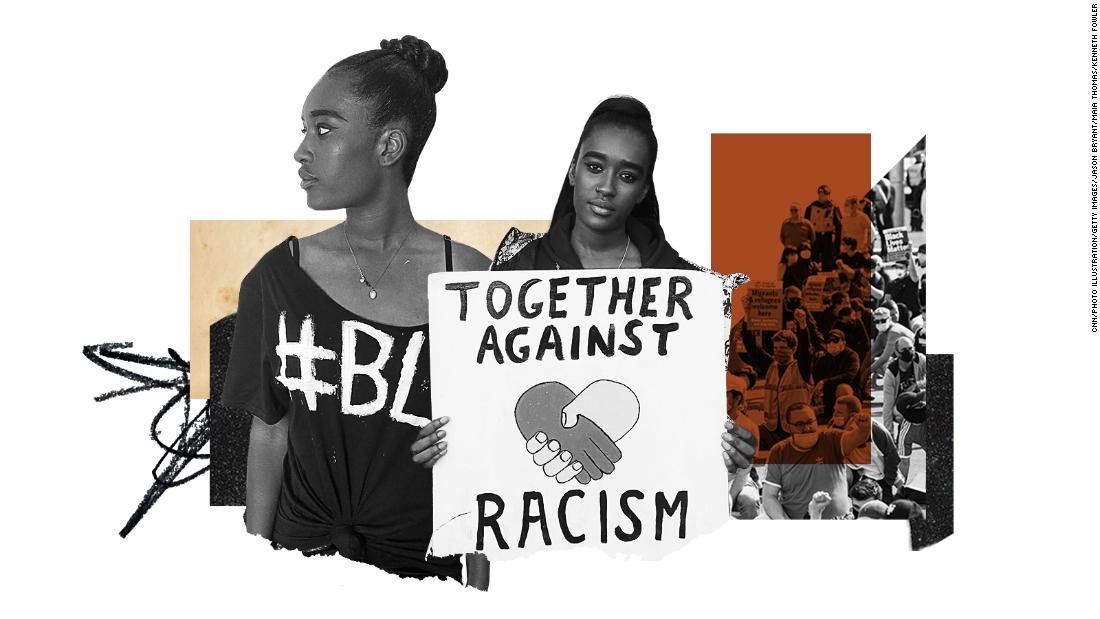
Maia Thomas, 21, is an activist who campaigns for Black history and anti-racism to be taught in English schools.
In June, Thomas used social media to organize a peaceful protest and vigil for Floyd in Exeter, a small, historic city in the English county of Devon, around 170 miles southwest of London.
"People were shouting at me in the street 'you're pretty for a Black girl, you should use your looks instead of your voice,' and 'White supremacy will always win.' I was threatened online by people saying they were going to attack, kill me and come after my family," she told CNN.
Thomas said she was physically assaulted by a man in Exeter. After the protest she said she required security patrols in the city's shopping center where she worked.
"I was given a key card to go through the back-exit doors just in case I was being followed," she said. "At times my manager escorted me. It was serious."
Despite the violence Thomas says she experienced, she regards the march as a success.
"There were more Black people at the protest than I've ever seen in the whole time that I've lived in Devon," Thomas said.
Many parts of Britain are predominately White. In Exeter alone, out of an estimated 128,900 residents, around 93% are White according to the UK's most recent census, in 2011.
Thomas' views on education had an immediate impact. Scores of schools and other educational institutions have asked for the 21-year-old's help to run equality workshops.
Activists are also pushing to diversify England's national school curriculum, though this has caused a backlash.
Kemi Badenoch, a Black government minister, for example, criticized the influence of BLM on education in an October 2020 speech in parliament.
Thomas is also a part of "Black Lives Matter Somerset," helping to produce Black History packs for schools and working to increase diversity within her local council. Next year she will attend a conference in Berlin as a UK delegate to speak about Britain's BLM movement.
She has no intention of stopping anytime soon, but says campaigning can feel overwhelming: "Every organization, business, school and individual does not realize how draining it is to constantly relive trauma because no one has actually wanted to listen until now.
"I realized in Zoom calls, assemblies and talks if it was any other subject, the school or council would pay for a speaker," she added. "So why should we as activists and educators be doing this for free?"
Liza Bilal
All Black Lives UK branch founding member, Bristol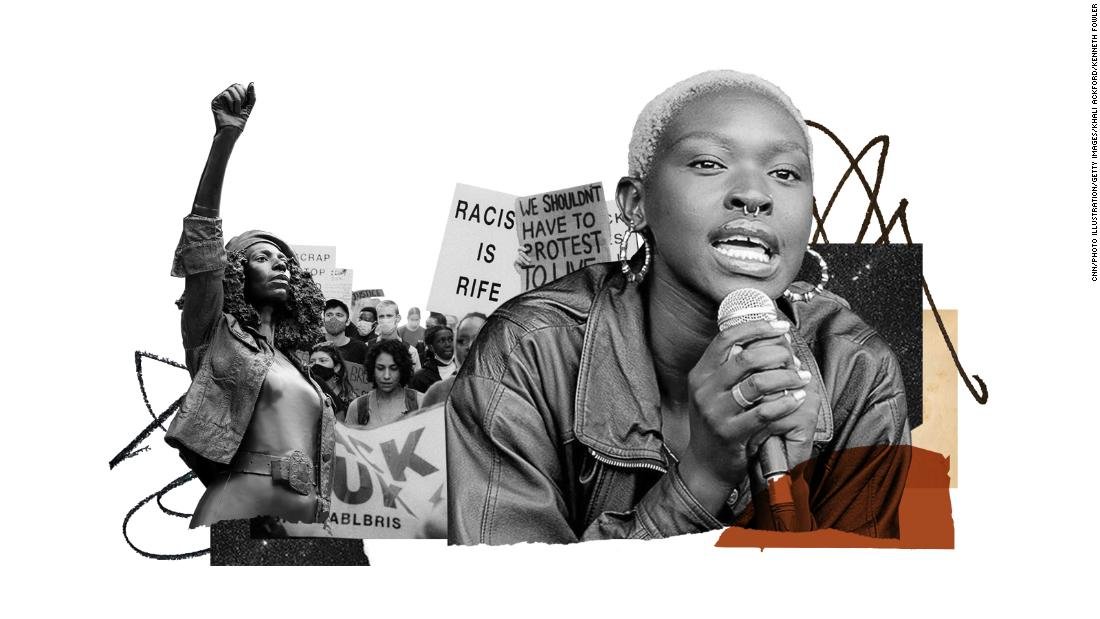
Liza Bilal is a 21-year-old student and one of the most prominent faces in Britain's BLM movement. In June, Bilal and five young activists arranged a protest in Bristol, a port city in southwest England that has strong historic links to the UK slave trade. Britain enslaved 3.1 million Africans between 1640 and 1807, transporting them to colonies around the globe, according to Historic England, a public body. Many of them left on ships from Bristol.
Bristol is now 78% White British with a growing Black, Asian and Minority Ethnic population at 16%.
An estimated 10,000 people marched in support of the BLM movement in Bristol on June 7. The peaceful protest culminated with demonstrators toppling the statue of 17th century slave trader Edward Colston and hurling it into the River Avon.
Their act of resistance became a focal point for protests in the UK. It ignited a national conversation on slave trader memorials, and Colston's empty plinth was secretly occupied with the statue of a BLM protester. That was removed 24 hours later by the local authority.
The protests were a call to be heard, said Bilal. "People have been petitioning for the statue to come down for decades and were routinely ignored by the council."
Bilal believes Floyd's death forced people outside the US to reflect on their own issues with racism. She said the brutality of his death awakened "a lot of people that hadn't really thought about systemic racism before."
The backdrop to 2020 has also been a deadly pandemic, where Britain's ethnic minorities are up to 50% more likely to die than White Brits, according to a recent government review. Bilal believes it's time for the UK to address institutional racism.
"Black and Brown people have been disproportionately affected. We know that's nothing to do with biology and everything to do with systemic racism," she said.
In November, the UK Human Rights Committee said the coronavirus death rate disparity in the UK is in part due to "deep-seated inequalities." The inquiry found that major factors include minority groups being more likely to work in frontline jobs and less likely to be protected with adequate PPE.
Yet the surge of protests has also had unintended consequences. Bilal fears the summer's demonstrations have emboldened Britain's far-right groups.
"In the summer I saw a group of White supremacists. I think there were maybe around 200-300 guarding the Cenotaph [war memorial] which is next to the plinth from which Edward Colston was torn down," she told CNN.
UK security experts warn that far-right extremism in the UK is increasing. In June more than 100 people were arrested after violence broke out at a far-right counter-protest in London targeting BLM demonstrations. UK Prime Minister Boris Johnson condemned the disruption as "racist thuggery."
The backlash hasn't halted the All Black Lives campaign's mission. They continue to hold monthly protests and weekly panels.
"We have to have a resilience that is unbreakable in the face of something as pervasive as White supremacy," said Bilal.
Graham Campbell
Scottish National Party councilor, Glasgow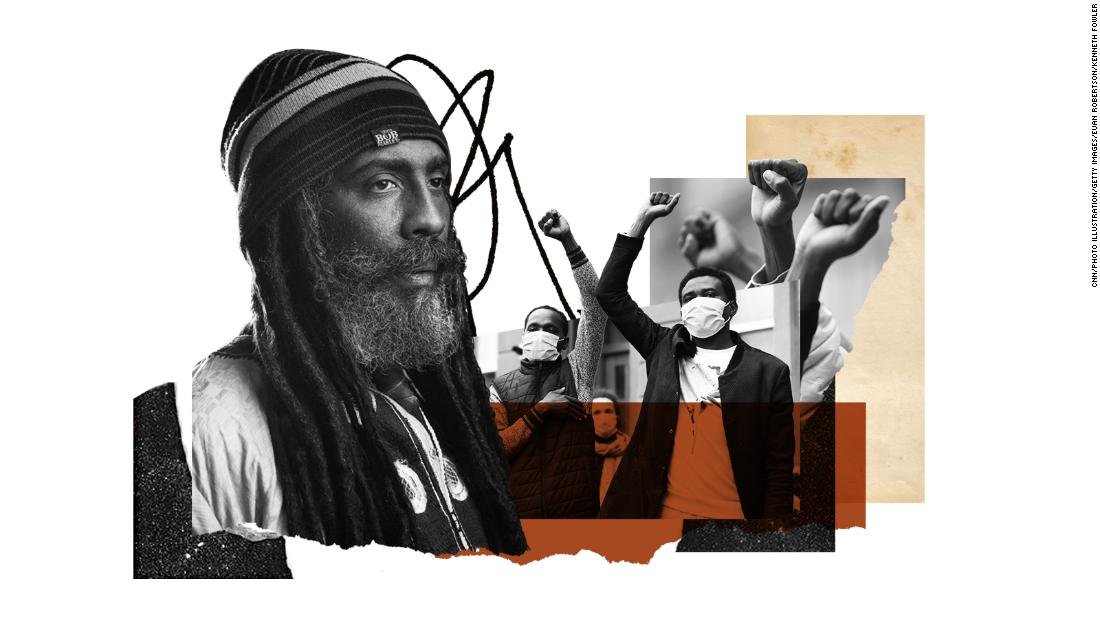
Since Scottish National Party (SNP) councilor Graham Campbell moved from London to Glasgow 20 years ago, Scotland's largest city has become increasingly ethnically diverse. Around 12% of Glasgow's population is from an ethnic minority, according to the 2011 census, and more than one in five students in the city's primary schools are from non-White backgrounds.
In 2017 Campbell became Glasgow's first African Caribbean councilor. He's determined to see the city's growing diversity reflected in its workforce, citing the underemployment of qualified Black professionals.
A 2016 analysis of government data by the UK's Trades Union Congress found that Black and ethnic minority graduates with a first degree were more than twice as likely to be unemployed as their White counterparts.
"They're not getting interviewed. They're not getting the breaks. There's been a lack of awareness that something structural [has] to adjust," Campbell told CNN.
In June, hundreds of people staged anti-racism rallies in the center of Glasgow. Campbell said the protests were the Black community's demand for change.
"This generation has decided that the racism, daily microaggressions, and experiences of exclusion from a job market -- they're no longer prepared to tolerate it. They felt the George Floyd moment. They said no more," Campbell said.
Since joining the local authority, Campbell has seen its ethnic minority workforce double. He wants to reach a proportionate level of employment by 2030.
"Had we relied on the rate that we were going, I calculated it would take 107 years before we got a proportionate level of Black employment," he said.
Campbell helped create an employment working group that monitors diversity in council departments. He worries that without enforcing inclusive hiring initiatives, equality would remain a pipe dream.
According to Campbell, changing place names and removing statues isn't enough to fight racism in Britain. Instead, he believes consciously challenging racism is necessary.
"People in Scotland too often presumed that you are anti-racist by default. In a racist society, especially one with a colonial history like Britain, you have to be actively anti-racist," said Campbell.
"It's the unconscious biases, that translate into institutional practices, that discriminate against non-White people."
Robert Walcott & Robert Cotterell
Director and chairman, Sheffield and District African Caribbean Community Association, Sheffield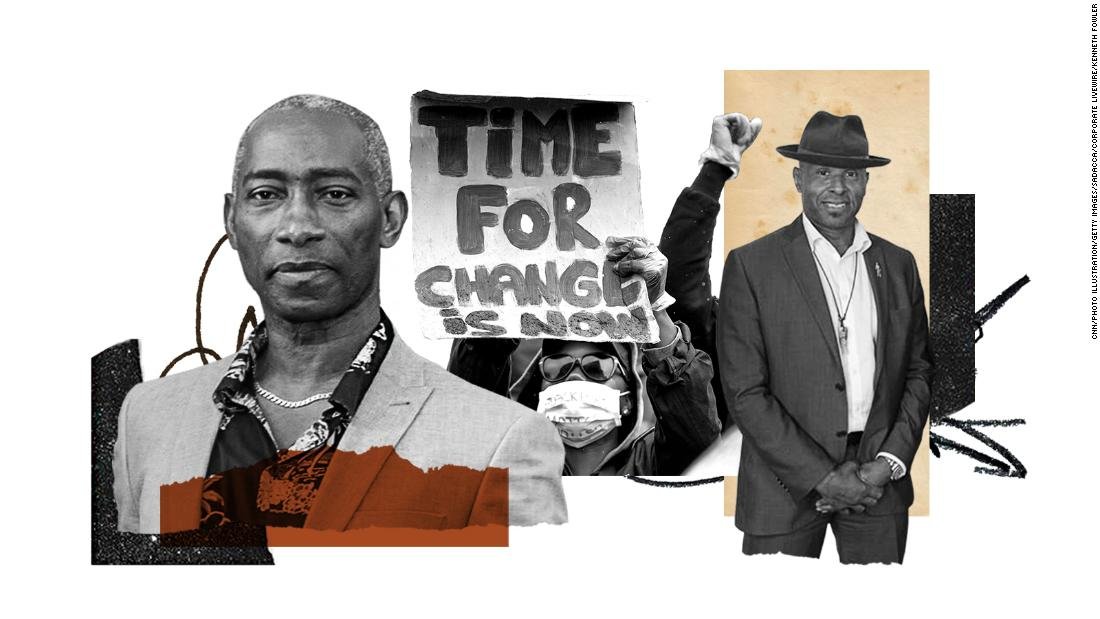
Sheffield is one of Britain's biggest cities, with a population of 575,400 in 2016 and around 20,000 Black residents, according to the 2011 census.
The Sheffield and District African Caribbean Community Association (SADACCA) provides a space for the local African and Caribbean communities to socialize in the northern English city.
Robert Walcott, a director of SADACCA, believes BLM should primarily help Black people in their day-to-day lives, rather than educating White audiences.
"I want to focus on what we are doing after the protests. I'd like to see more of what we're doing to support ourselves as opposed to trying to raise the issue to a White audience," he told CNN.
Walcott's mother is a part of the Windrush generation, the Caribbean immigrants who moved to the UK from the late 1940s at the invitation of the government.
The Windrush generation was invited to Britain to rebuild the country after World War II. They comprised the UK's first large wave of Caribbean migration and were named after the Empire Windrush passenger liner that carried some of them across the Atlantic.
The cruel consequences of tougher immigration policies implemented from 2012 were revealed five years later, in what came to be known as the Windrush scandal.
Those who had arrived decades earlier, without papers to prove their legal status as citizens as such documentation wasn't needed before, had been denied government services, wrongly detained or even deported.
"I think there is a slight disconnect between the Windrush elders because they don't fully understand why there is such hostility from young people towards the situation," he said.
Walcott said that "racism was a fact of life" for the Windrush generation, who see younger Black people as currently having more opportunities than they did.
"There have been more opportunities for Black people [created] in their lifetime," he added.
"There is a fragility of people who are still refusing to accept that racism is the world's number one pandemic. Still people don't even know what racism is or about England's major role in the slave trade," said Robert Cotterell, SADACCA chairman.
BLM grabbed headlines in 2020 but the movement has been active since 2012, when Trayvon Martin's death sparked the hashtag. The deaths of several African Americans at the hands of police have kept protesters marching since.
Before the protests "there were no conversations at all from institutions and key players in the city," said Cotterell.
SADACCA has continued discussions with authorities and institutions in Sheffield that "traditionally have had, and still have, issues around institutional structural racism."
Despite the growing interest in hearing Black voices, Cotterell says anti-racism activists aren't fairly compensated for their time and work.
"They can't keep using us as the experts because if we were White, we'd be getting paid for our knowledge," Cotterell told CNN. "If we were White, we would become consultants, we'd be getting paid... £1,500 a day."
A CNN/Savanta ComRes poll this year found that Black Britons' experiences with racism differ from other ethnic groups. "Black people are considerably more dissatisfied with race relations in Britain than other ethnic minorities," said Chris Hopkins, associate director of Savanta ComRes.
Nadia Thomas
BLM activist, Chepstow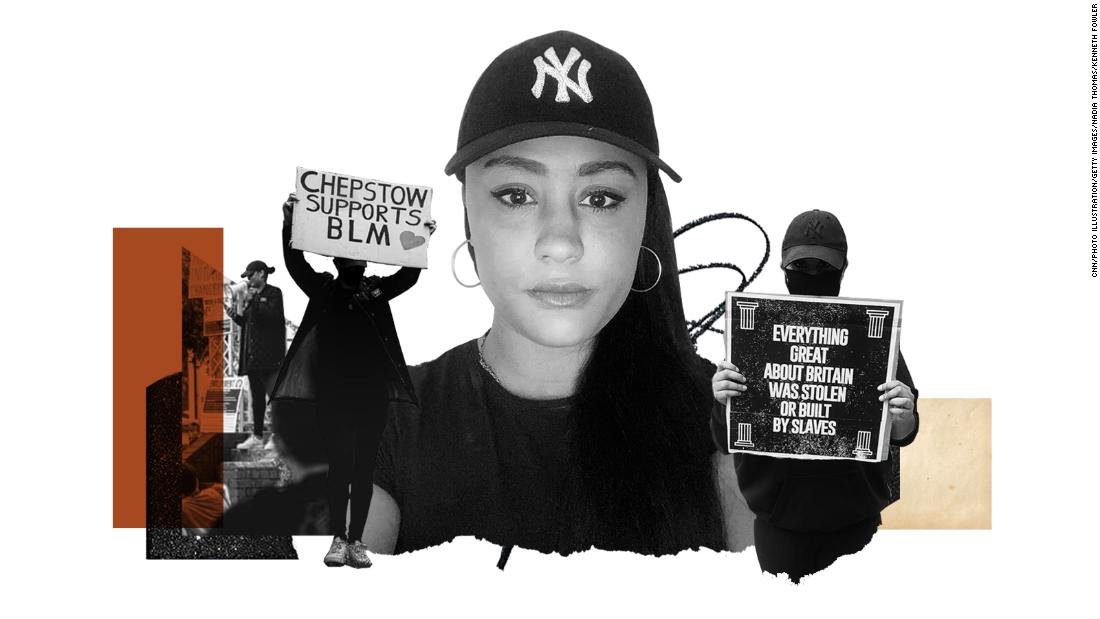
Nadia Thomas, 25, says she was forced to cut ties with a close family member after receiving relentless offensive messages due to her supporting BLM.
While 95.6% of the population of Wales is White, in Chepstow, a small town near the border with England, that figure is 98.1%.
"My relative sent me a meme from the film 'Zulu' where all the British soldiers took over South Africa and knelt, about to go into battle. It said, 'me and the boys, hashtag taking the knee,'" Thomas told CNN.
With a mixed-race background and having both White and Black parents, Thomas was shocked by her White relative's insensitivity. The relative had worked for her Antiguan father for many years.
"It's an awakening and it goes beyond ignorance," she said.
In June this year Thomas and a group of friends organized a BLM protest. "At first, I couldn't take part, I didn't even want to turn on the TV," she said.
As Thomas watched the cause spread globally she became less skeptical.
She felt responsible for confronting the racism within her own town -- no matter how small or rural. "Since Brexit, [Donald] Trump and Boris [Johnson]... people aren't afraid to be racist. I always thought it was a passive ignorance in this country and now I see blatant racism. It's clearly always been here and it's now allowed by people in power," Thomas told CNN.
In post-Brexit Britain, overt racism appears to be growing. Last year a report found that 71% of people from ethnic minorities in the UK had reported experiencing racial discrimination, an increase of 13 percentage points since the 2016 Brexit vote.
Thomas is working on ways to tackle racism in Chepstow. "I've got a meeting with the Labour Party and my constituency to do with Black history and diversity workshops in school curriculums," she told CNN.
"Nationally, this needs to be addressed. I don't want to just protest. I want to shake up the world."
Khady Gueye
Local Equality Commission founder, Gloucestershire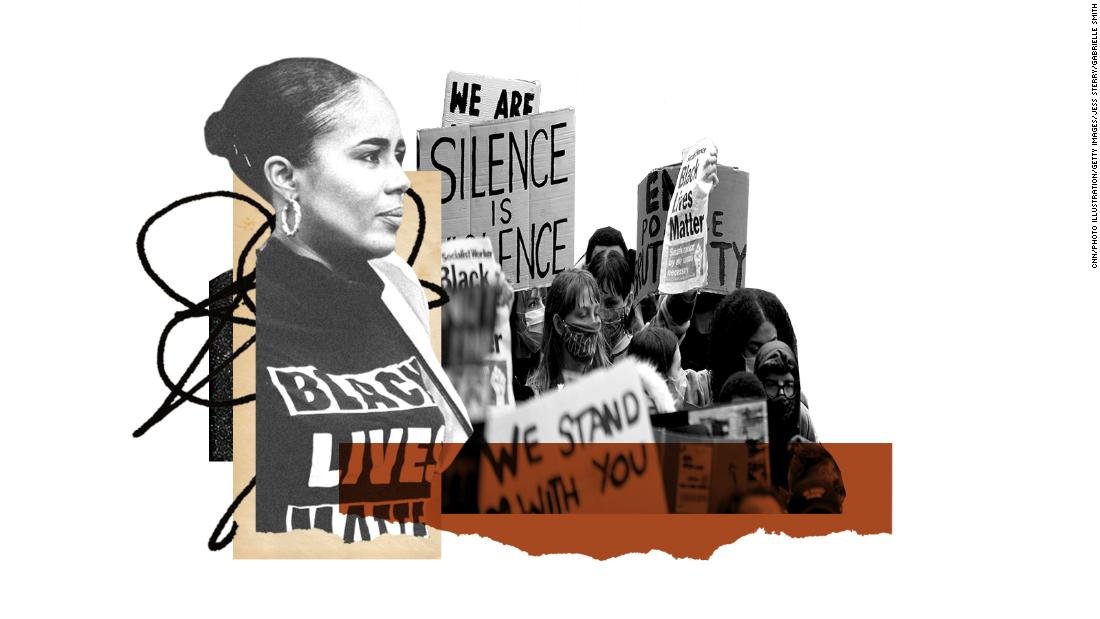
When Khady Gueye co-organized a BLM protest in Lydney, Gloucestershire, a small town in southwest England, she didn't know it would come with controversy. Members of the local council wrote an open letter demanding the demonstration be canceled, two local councilors resigned in protest due to the letter, and Gueye began to feel unwelcome in her hometown, though the event eventually went ahead.
"We were followed home. We were threatened. We were told people were coming to find us. I moved out of my house for a few weeks just because someone followed me home," said Gueye who is mixed-race Senegalese-British.
In response to the backlash, she founded the Local Equality Commission, a racial equality group that runs workshops to challenge racism in rural areas.
"The main aim of that was to try and suture some of the divides that occurred because of the protests that we organized," Gueye told CNN. "We wanted to reaffirm to people that this isn't a problem that's going away."
According to Gueye, education on racism is needed most in rural areas: "The UK doesn't seem to understand how the BLM movement in the US resonates with the UK. In rural areas we don't have the exposure to diversity. There is no exposure to this knowledge."
The voices of Gueye and others in small towns demonstrate the power of protest, education and allyship. As the national focus on BLM dies down, Gueye aims to keep the conversation alive in Gloucestershire.
"George Floyd's murder is the perfect example of the police brutality that happens frequently throughout the world, throughout the US, throughout the UK. We are in a system that is failing Black people," said Gueye.
"Everything that has happened over the past six months has been a trajectory towards change," she added. "It's about trying to engage with people who don't necessarily understand or empathize with what we're trying to fight for."











